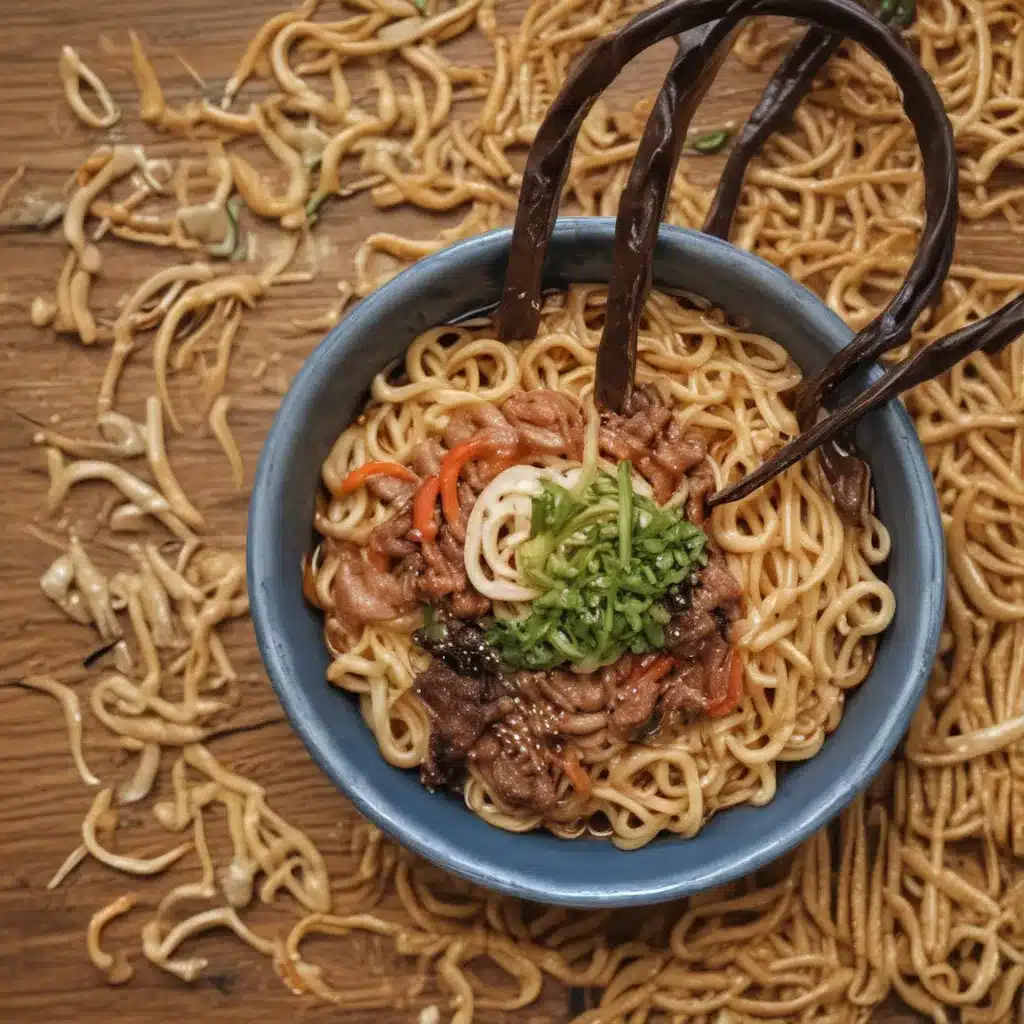
Unlocking the Power of Korean Cuisine for Your Grey Matter
As a lover of all things Korean, I’ve always been fascinated by the incredible depth and complexity of their culinary traditions. But did you know that beyond the mouthwatering flavors, many classic Korean dishes also pack a powerful punch when it comes to brain health? That’s right, folks – get ready to feed your noodles and neurons with this delectable dive into the neuro-nutritive world of Korean cuisine.
Let’s start with the humble Korean staple – kimchi. This fermented cabbage delight isn’t just a zesty accompaniment to your meal, it’s a veritable treasure trove of brain-boosting benefits. The probiotic powerhouses in kimchi have been shown to enhance cognitive function, improve mood, and even protect against neurodegenerative diseases. Imagine – a spoonful of that tangy, crunchy goodness could be the key to unlocking your full mental potential.
And what would a Korean feast be without the beloved bibimbap? This colorful, customizable rice dish is more than just a feast for the eyes – it’s a nutritional symphony for your noggin. The combination of nutrient-dense veggies, protein-packed meat (or tofu for the plant-based folks), and the umami-rich gochujang sauce creates a veritable brain-boosting bonanza. The antioxidants in the produce, the omega-3s in the fish (or walnuts for vegetarians), and the anti-inflammatory properties of the gochujang all work in harmony to support cognitive function and protect your precious grey matter.
But let’s not forget the star of the show – the humble Korean noodle. From the slurp-worthy japchae to the comforting jjamppong, these noodle dishes are true brain food. The complex carbohydrates in the noodles provide steady energy to fuel your neural pathways, while the accompanying vegetables, proteins, and sauces deliver a symphony of brain-nourishing nutrients. And let’s not forget the mood-boosting properties of a big, steaming bowl of noodles – there’s just something about that slurpy, savory goodness that can instantly lift your spirits and put a spring in your step.
Delving Deeper into the Neuro-Nutritive Superstars of Korean Cuisine
Now that we’ve whet your appetite for the brain-boosting benefits of Korean food, let’s dive a little deeper into some of the star players. Get ready to be amazed by the powerful, personalized ways these dishes can support your cognitive health.
Kimchi: The Probiotic Powerhouse
As I mentioned earlier, the fermented magic of kimchi can do wonders for your brain. The gut-friendly probiotics in this tangy, crunchy delight have been shown to positively influence mood, memory, and even neurological function. In fact, a study published in the Journal of Medicinal Food found that regular kimchi consumption was associated with improved scores on cognitive function tests.
But the benefits of kimchi don’t stop there. The antioxidants in the cabbage and other veggies used to make it can help neutralize harmful free radicals and reduce inflammation in the brain. And the spicy kick from the chili peppers? That’s a natural mood-booster, thanks to the endorphin-releasing properties of capsaicin.
So, the next time you’re craving a flavor explosion, remember that you’re not just indulging your taste buds – you’re also nourishing your neurons. A heaping spoonful of kimchi could be the secret to unlocking your full mental potential.
Bibimbap: A Brain-Boosting Bowl of Bliss
As I mentioned earlier, bibimbap is a Korean culinary superstar when it comes to brain health. This vibrant, customizable rice dish is a veritable treasure trove of neuro-nutritive goodness.
The key to bibimbap’s brain-boosting powers lies in its diverse array of ingredients. The nutrient-dense veggies, like spinach, carrots, and bean sprouts, are packed with antioxidants, vitamins, and minerals that can support cognitive function and protect against neurodegeneration. The addition of a protein-rich ingredient, like beef, chicken, or tofu, provides the building blocks for healthy brain cells and neurotransmitters.
But the real star of the show is the gochujang sauce. This savory, spicy condiment is a powerhouse of anti-inflammatory compounds that can help reduce brain inflammation and support overall neurological health. And let’s not forget the mood-boosting benefits of that delightful umami flavor – there’s just something about a big, satisfying bowl of bibimbap that can instantly lift your spirits and put a spring in your step.
So, the next time you’re craving a brain-nourishing feast, don’t hesitate to order up a heaping helping of bibimbap. Your neurons will thank you for it!
Korean Noodles: A Slurp-Worthy Celebration of Brain Health
As I mentioned earlier, Korean noodle dishes are true superstars when it comes to brain health. From the silky smooth japchae to the hearty, savory jjamppong, these noodle-centric creations are a veritable treasure trove of neuro-nutritive goodness.
The complex carbohydrates in the noodles themselves provide a steady, sustained source of energy to fuel your neural pathways. But the real magic happens with the accompanying ingredients. The nutrient-dense veggies, the protein-packed meats (or tofu for the plant-based crowd), and the umami-rich sauces all work in harmony to support cognitive function and protect your precious grey matter.
Take, for example, the beloved japchae. This sweet and savory noodle dish features a blend of chewy sweet potato noodles, crunchy vegetables, and a delectable soy-based sauce. The antioxidants in the veggies can help neutralize harmful free radicals, while the omega-3s in the sesame oil provide anti-inflammatory benefits to support overall brain health.
And then there’s the comforting jjamppong, a spicy seafood noodle soup that’s like a warm hug for your neurons. The protein-rich seafood, the nutrient-dense veggies, and the anti-inflammatory properties of the gochujang-based broth all work together to nourish your brain and lift your mood.
So, the next time you’re craving a brain-boosting culinary adventure, don’t hesitate to dive into a big, slurp-worthy bowl of Korean noodles. Your taste buds and your grey matter will thank you for it!
Connecting the Dots: Korean Cuisine and Cognitive Function
As we’ve explored, the powerhouse ingredients and flavor profiles of Korean cuisine can do wonders for your brain health. But how exactly do these neuro-nutritive superfoods work their magic? Let’s take a closer look at the science behind the brain-boosting benefits of Korean food.
One of the key mechanisms at play is the anti-inflammatory properties of many Korean ingredients. Compounds like the capsaicin in chili peppers, the polyphenols in fermented foods like kimchi, and the omega-3s in seafood can all help reduce inflammation in the brain. And we all know that chronic inflammation is a major contributor to cognitive decline and neurodegenerative diseases.
But the benefits of Korean cuisine don’t stop there. Many of the nutrients found in these dishes, such as vitamins B and C, zinc, and antioxidants, can also support neurological function by protecting brain cells, enhancing neurotransmitter production, and improving blood flow to the brain.
And let’s not forget the gut-brain connection. The probiotic power of fermented foods like kimchi can positively influence the gut microbiome, which in turn can have a profound impact on mood, memory, and overall brain health. It’s like a two-way street – a happy gut leads to a happy brain, and vice versa.
But perhaps the most fascinating aspect of the brain-boosting benefits of Korean cuisine is the way the different components work together in synergy. It’s not just about individual superfoods, but rather the harmonious blend of flavors, textures, and nutrients that can create a veritable symphony of neuro-nutritive goodness.
So, the next time you sit down to a delectable Korean feast, remember that you’re not just indulging your taste buds – you’re also nourishing your neurons. It’s a win-win situation for your body and your brain!
Putting it All Together: A Korean Culinary Prescription for Cognitive Health
Now that we’ve explored the incredible brain-boosting benefits of Korean cuisine, it’s time to put it all together into a practical, delicious prescription for cognitive health.
First and foremost, let’s talk about the importance of incorporating a variety of Korean dishes into your diet. Mixing and matching different culinary creations, from the probiotic powerhouse of kimchi to the mood-boosting magic of bibimbap, can provide a well-rounded approach to nourishing your brain.
But it’s not just about the individual dishes – it’s also about the way you enjoy them. Slowing down, savoring the flavors, and truly connecting with your food can have a profound impact on your mental well-being. After all, there’s something about the ritual of a Korean meal, with its communal sharing and mindful eating, that can be incredibly grounding and therapeutic for the brain.
And let’s not forget the importance of balance. While Korean cuisine is undoubtedly a treasure trove of brain-boosting goodness, it’s important to remember that moderation is key. Overindulging in any one dish, no matter how nutritious, can have its downsides. The key is to find a sustainable, enjoyable way to incorporate these neuro-nutritive superfoods into your daily life.
So, the next time you’re craving a brain-nourishing feast, don’t hesitate to head to your local Korean eatery (or, if you’re in the Boston area, be sure to check out Korean Garden Boston for an authentic, brain-boosting culinary experience). Slow down, savor every bite, and let the harmonious flavors and nutrients work their magic on your grey matter. Your neurons will thank you for it!
